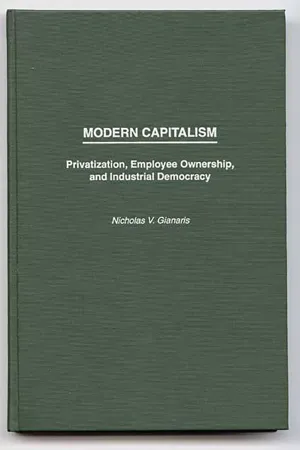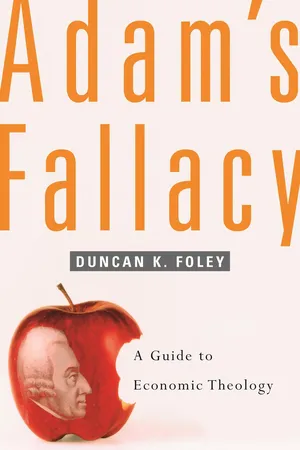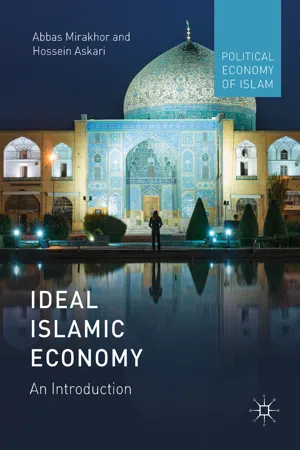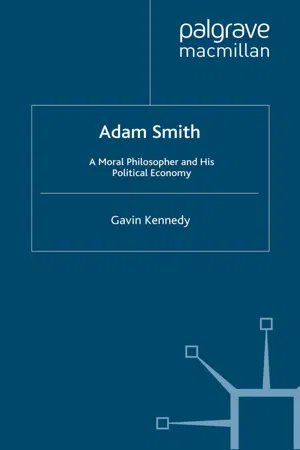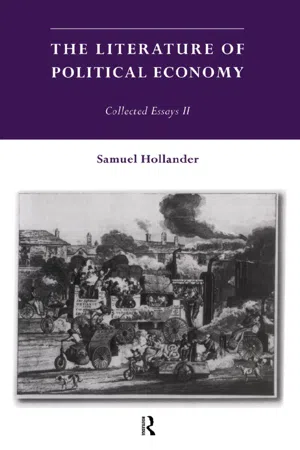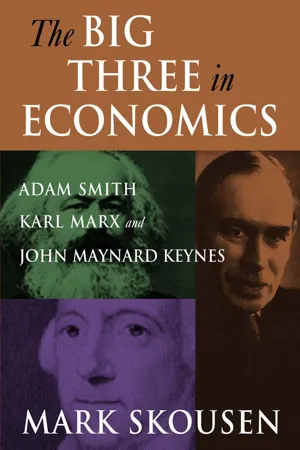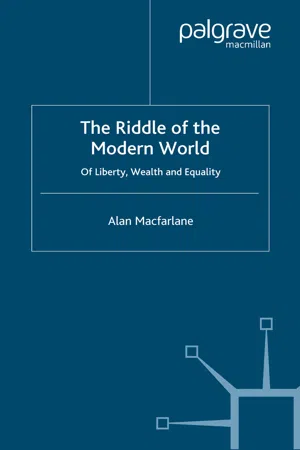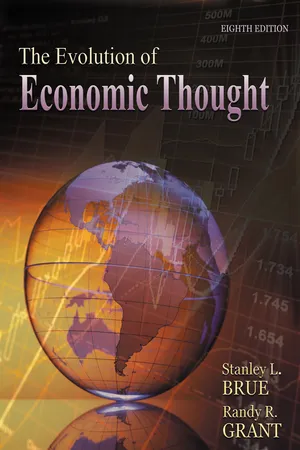History
Adam Smith and Capitalism
Adam Smith, a key figure in the development of capitalism, is known for his influential work "The Wealth of Nations." He advocated for free markets, the division of labor, and the concept of the "invisible hand" guiding economic activity. Smith's ideas laid the foundation for modern capitalist economies, emphasizing individual self-interest and competition as drivers of economic growth and prosperity.
Written by Perlego with AI-assistance
Related key terms
1 of 5
12 Key excerpts on "Adam Smith and Capitalism"
- eBook - PDF
Modern Capitalism
Privatization, Employee Ownership, and Industrial Democracy
- Nicholas V. Gianaris(Author)
- 1995(Publication Date)
- Praeger(Publisher)
Adam Smith, the eighteenth-century Scottish philosopher and a witty and absent-minded professor, is considered as the father of political economy. In his book, An Inquiry into the Nature and Causes of the Wealth of Nations, which is to democratic capitalism what Marx's Das Kapital was to socialism, Smith argued that private property and self-interest are essential to promote the wealth of all countries, 3 whereas Marx's idea about the evil of private property was swept away with the collapse of communism. Evidence shows that arguments of Aristotle and Adam Smith have become powerful for all countries transferring government ownership to private ownership, whereas socialist noble aspirations proved Utopian and impractical. State ownership, which began growing at the turn of the century, mainly in Europe in railroads, electric power, and other utilities, and more inten- sively in the post-World War II years, was reversed by privatization, which started in the 1970s and early 1980s. What was started by Margaret Thatcher and the "Chicago Boys" has spread to many countries and evidence is that private ownership motivates individuals and works more productively than public management, even without competitive pressure, in almost all cases of privatization. However, Smith was not an extreme advocate of laissez-faire. He supported public works, disfavored private monopolies, Introduction 3 and argued that no society can be happy if a large segment of the population is poor. As governments mimic business and public officials emulate entrepre- neurs, questions are raised about accountability and fairness. Because bureaucrats are less innovative and effective than private entrepreneurs, there is a trend to consider big business more efficient than big government, leading to the support of privatization. - eBook - ePub
Reflections on Commercial Life
An Anthology of Classic Texts from Plato to the Present
- Patrick Murray(Author)
- 2014(Publication Date)
- Routledge(Publisher)
Adam Smith (1723–1790) DOI: 10.4324/9781315870601-9 ADAM SMITH did not always succeed in properly conceptualizing modern commercial forms, but that did not keep him from being a brilliant, if uneasy, advocate of capitalism. Smith’s four stages of human history bear some resemblance to Aristotle’s forms of acquisition, but Smith’s narration ends on quite a different note: commercial, that is capitalist, society is the highest and final stage of social evolution. In a commercial society, as a rule, goods and services take the commodity form, labor takes the form of wage labor, and the economic initiative lies with capitalists, or “undertakers.” Sensing the intercon-nectedness of these forms, Smith simultaneously defends the capital form, the generalization of the commodity form, wage labor, and the nearly absolute use rights of private property owners. As the title of his famous book The Wealth of Nations suggests, capitalism s main draw for Smith was its remarkable capacity to generate “that universal opulence which extends itself to the lowest ranks of the people.” Smith believed, as had Locke, that, even if the resulting abundance was divided into preposterously unequal portions, the rising tide of wealth would lift the laboring poor of commercial societies—”that is, the great body of the people”—to heights of material comfort unimaginable to the rulers of “rude” societies. Further benefits of commerce, he said, were its tendencies to make society orderly and well governed. “Unintended consequences” is our dull revision of “the invisible hand,” Smith’s memorable phrase that appears but once in The Wealth of Nations. With it he crystallized a notion dear to Mandeville and Hume that settled into German Idealism by way of Kant’s historical essays, eventually reminted by Hegel as the “cunning of reason.” No one intends the happy consequences of commerce - eBook - PDF
- Stephen Copley, Kathryn Sutherland(Authors)
- 2024(Publication Date)
- Manchester University Press(Publisher)
3 Adam Smith and the 'free market' HEINZ L UBASZ There's definitely something odd about the way Adam Smith and the Wealth of Nations have come into vogue during the past fifteen years or so: partisans of what has come to be known as the 'free market' present themselves as true disciples of Smith - yet they seem to care much more for his image than for his ideas. Take, for example, Ronald Reagan's White House, where in the 1980s the 'free market' was all the rage: the President's aides literally sported ties bearing silhouettes of Adam Smith 1 - probably the first time in history an economic theorist has been turned into a pin-up boy. Or, on a different plane, consider the article written by the late Professor Friedrich von Hayek in The Daily Telegraph to mark the two-hundredth anniversary of the publication of the Wealth of Nations in 1776. Hayek, an eminent economist and one of the chief champions of the 'free market', promises to convey 'Adam Smith's Message in Today's Language'. 2 But apart from a quotation from one of Smith's other books, what the article contains is not Adam Smith's ideas but Hayek's, and the language they're conveyed in is not so much today's plain speech as it is the vocabulary of Hayek's own theories and preoccupations. On a different plane yet again, one could fairly expect the self-named Adam Smith Institute to be devoted to the principles of the august economist whose name it bears, including his well-grounded opposition to monopolies. What one finds instead is an Adam Smith Institute that helps the British government to transform public utilities such as gas, electricity and even water into - private monopolies! The more one thinks about it, the more one feels that such people are 46 Adam Smith's Wealth of Nations simply using Smith as a sort of logo for the 'free market', enhancing the status of their own ideas - how meritorious soever - by invoking his name. - eBook - PDF
Adam’s Fallacy
A Guide to Economic Theology
- Duncan K. Foley(Author)
- 2009(Publication Date)
- Belknap Press(Publisher)
1 / A d a m ’s V i s i o n T he publication of Adam Smith’s The Wealth of Nations in 1776 marks a turning point in political economy. Before Smith, politi-cal economy addressed problems of public policy and particu-larly public finance, seeking to advise sovereign governments how to manipulate and channel the wealth-creating power of markets to their direct advantage. Smith widened the perspective to embrace the much larger questions of how society can function productively, and the relation between economic institutions like the market and indi-viduals’ lives. In taking this step Smith consolidated, even if he did not initiate, a way of looking at modern society as made up of two spheres: an economic sphere of individual initiative and interaction, governed by impersonal laws that assure a beneficent outcome of the pursuit of self-interest; and the rest of social life, including political, religious, and moral interactions which require the conscious bal-ancing of self-interest with social considerations. This division is the foundation of the liberal economic world-view that in one form or 1 another has shaped political economy and economics as intellectual disciplines. Adam Smith was a student and then a professor of moral philoso-phy at the University of Glasgow; his interests moved from moral philosophy proper to the sphere of political economy. He was part of the circle of the Scottish Enlightenment, a hotbed of liberal and pro-gressive thinking in mid-eighteenth-century Europe. After the publi-cation of The Theory of Moral Sentiments in 1759, the support of a patron allowed Smith to retire from active university teaching to travel and meet leading foreign political economists as part of his work on An Inquiry into the Nature and Causes of the Wealth of Na-tions. Adam Smith was not the first political economist, nor indeed the first proponent of the ideas on economic life and policy that made him and his book famous and influential. - eBook - PDF
Ideal Islamic Economy
An Introduction
- Abbas Mirakhor, Hossein Askari(Authors)
- 2017(Publication Date)
- Palgrave Macmillan(Publisher)
Macpherson believes that the popularity and the staying power of liberal individualism from the seventeenth to the twentieth centuries were due to the fact that it was a representation of existing circumstances of societies given “the inevitability of everyone’s subordi- nation to the laws of the market” (p. 272). Konings suggests that the logic of possessive individualism was the engine that drives capitalism. 79 It is this conceptualization of capitalism that appears to summarize the socio-political-economic system in contemporary industrial societies. In forming his theoretical conception of capitalism, Macpherson considered political, economic and cultural as “intimately related. This was the domain where Adam Smith, David Ricardo, and Marx developed their views.” 80 Like Macpherson, Adam Smith (and Marx) did not use the term capi- talism but defined a system, which is identified as ideal capitalism. Smith referred to this system as “commercial society,” rather than capitalism. 81 Adam Smith’s greatest attribute as a scholar was his eclecticism. His system 2 CAPITALISM AND THE ISLAMIC ECONOMIC SYSTEM 59 of thought was influenced by Greek, Roman, Christian and Scientific thinking, particularly that of Newton, natural law movement of Grotius, social contract and liberalism of Hobbes, Locke, Pufendorf, and Rousseau. He wrote at a time when deism dominated the spiritual climate of England and Scotland. As a deist, he considered the social and economic life of man as heavily influenced by Natural Law and guided by an invisible hand to serve the good of the society even if humans are engaged only to act in pursuit of their own self-interest. Even though the term invisible hand appears only a few times in his major writings and only once in The Wealth of Nations, it is clear that Adam Smith thought that the operation of socio-economic system was analogous to the workings of the physical system as envisioned by Newton. - eBook - PDF
Adam Smith
A Moral Philosopher and His Political Economy
- G. Kennedy(Author)
- 2016(Publication Date)
- Palgrave Macmillan(Publisher)
The ‘missing’ millennium since the fall of Rome was not just an incidental event; it had profound effects on the social evolution from agriculture to commerce. This context explains Wealth of Nations. As a mere textbook of economics it made, and makes, little sense to those who know nothing of its context, except as something on the fringes of historical curiosity, suitable for taking numerous ‘racy’ quotations out of context and for presentation volumes as prizes or for retirement. Treat- ing Wealth of Nations as a philosopher’s report of his fastidious enquiry into the process by which commerce had emerged again, what exactly were the ‘laws of motion’ that drove that re-emergence and what sub- verted the natural growth-inducing effects of commerce from happening makes eminent sense. Because of the overarching policies of mercantile political economy and its associated nation-state management, Wealth of Nations excels above anything else produced in the 18th century, and General Introduction: Why Adam Smith? 9 it continues to make contributions to the discourse among competing schools of economic thought. Wealth of Nations Wealth of Nations consists of five books. In Books I and II, Smith traces the historical context of society’s development from the ‘rudest’ age of man (the hunters, represented by North American ‘Indian’ tribes) through to the ‘commercial’ age (which evolved eventually from the division of labour, prompted by the human propensity to ‘truck, barter, and exchange’), which is the defining characteristic of Smith’s political economy. 19 Smith did not define economics as ‘a science which stud- ies human behaviour as a relationship between ends and scarce means which have alternative uses’. 20 For many modern neoclassical econom- ists, their subject is primarily about ‘economising’, while for Adam Smith ‘exchange’ was the foremost and dominant characteristic of human social, moral and economic relationships. - eBook - ePub
The Invisible Handcuffs of Capitalism
How Market Tyranny Stifles the Economy by Stunting Workers
- Michael Perelman(Author)
- 2011(Publication Date)
- Monthly Review Press(Publisher)
CHAPTER SIX Adam Smith’s Historical Vision The Wealth of NationsIt is time now to explore the intellectual roots of Procrustean economics. This chapter will explore the little-known Procrustean side of Adam Smith. Associating Adam Smith with the authoritarianism of the Procrusteans might seem somewhat incongruous. People popularly identify Smith with the invisible hand, not the invisible handcuffs. This favorable interpretation is understandable.Virtually every contemporary school of economics finds something to admire in Smith. As Jacob Viner, a conservative University of Chicago professor, wrote, “Traces of every conceivable sort of doctrine are to be found in that most catholic book, and an economist must have peculiar theories indeed who cannot quote from The Wealth of Nations to support his special purpose.”1 Liberals, radicals, and even Marxists have embraced Smith because of his frequent expressions of progressive sentiments.Adam Smith’s objective was to portray the market as a realm of liberty and justice, devoid of conflict. For Smith, the market would lead toward a world in which nobody was able to take advantage of anybody else. Once market norms became common, aristocrats would no longer be able to enjoy inherited privileges; businessmen would be unable to take advantages of their connections to win favors from the government; and workers would share in the bounty of their hard work.Smith believed that market forces would naturally erode the power of the aristocrats and well-connected businessmen. However, Smith seemed at a loss to show how market forces would make workers accept the rules of the market as just, given workers’ antagonism to market forces.Smith tried to find a way out of this morass by sweeping any hint of class conflict under the rug, portraying the market as a system of voluntary transactions. Toward this end, he turned his readers’ attention away from the point of production, where employers had the authority to directly command their workers. - eBook - ePub
The Literature of Political Economy
Collected Essays II
- Samuel Hollander(Author)
- 1997(Publication Date)
- Routledge(Publisher)
Part IIIADAM SMITH
Passage contains an image
7THE HISTORICAL DIMENSION OF THE WEALTH OF NATIONS*
I. ECONOMIC THEORY AND HISTORY
Since the publication of the Principles of Political Economy in 1817 it has been common to read of a sharp breakaway by Ricardo from Smithian methodology. An early statement of the contrast discerned is by Simonde de Sismondi who compared Smith’s view of political economy as ‘une science d’expérience’ with Ricardo’s speculations (1951 [1827], I:69–70). Statements to much the same effect appear in two important new works on classical economics—Soweil 1974:113–14 and O’Brien 1975:67.1The presumed contrast between Smithian and Ricardian procedures is frequently related to Smith’s place within the Scottish Historical School— that group of historians which includes Adam Ferguson, William Robertson, and John Millar—whose members, it is said, ‘were concerned to base their social and economic generalizations on firm historical facts, and were opposed to abstract speculation and conjecture’ (O’Brien 1975:66–7).2 More generally, it has been observed that ‘the idea of the progress of society can be described as the historical frame of reference of the Wealth of Nations’ (Forbes 1954:648).3 There is no comparable dimension in Ricardo’s Principles.On our reading of the primary literature, the sharp contrast between a Smithian empirico-historical approach and a Ricardian hypotheticodeductive approach is invalid. Ricardo’s procedures were derived from a pattern formulated by Smith.Smith’s main object in the Wealth of Nations was the formulation of a reform programme on the basis of an analytical model of the operation of a capitalist exchange economy. More specifically, he wished to demonstrate the adverse effects upon development of distortions in resource allocation due to a variety of contemporary policies and institutions which remained in force without the justification they might once have had. At the same time he isolated contemporary institutions which had a favourable effect on growth. The understanding of the origins of such institutions could only be appreciated in terms of an historical account, and here we discern a fundamental function of the historical dimension of the Wealth of Nations. Smith engaged not merely in description of the historical record, as he understood it—particularly the transition from an agricultural system (entailing a service nexus) to a mixed system (entailing a money nexus)— but also in interpretation. Both the theme and the principles involved in its interpretation, namely a materialist conception of history and a general notion of the temporal priority of agriculture over commerce during the course of ‘normal’ development, were characteristic of the Scottish historical literature. But two points require emphasis: The historical analysis is best viewed as a digression, for the recommendations for the reform of actual institutions and policies—the statement of which constitutes the prime objective of the Wealth of Nations—are based upon a rather precise analytical model of the ‘progress of society’ applicable to a competitive capitalist exchange economy. The model of development utilized in this context is a classic example of hypothetico-deductive theorizing and cries out for mathematical formulation. (A second prime example of such method in the Wealth of Nations is the theory of value and distribution, which is in some respects even more important from the point of view of its influence on nineteenth-century thought.) At the same time it must be emphasized that, in any event, there is no clash between the stadial sequence discerned by the Scottish Historical School—aspects of which are to be found in the Wealth of Nations—and that which is entailed in the Smithian analytical model, although the latter is designed for the analysis of economic process in the final ‘stage’ and stands on its own feet independently of the Scottish procedures.4 - eBook - ePub
The Big Three in Economics: Adam Smith, Karl Marx, and John Maynard Keynes
Adam Smith, Karl Marx, and John Maynard Keynes
- Mark Skousen(Author)
- 2015(Publication Date)
- Routledge(Publisher)
It was not a book for aristocrats and kings. In fact, Adam Smith had little regard for the men of vested interests and commercial power. His sympathies lay with the average citizens who had been abused and taken advantage of over the centuries. Now they would be liberated from sixteen-hour-a-day jobs, subsistence wages, and a forty-year life span.Adam Smith Faces a Major Obstacle
After taking twelve long years to write his big book, Smith was convinced he had discovered the right kind of economics to create “universal opulence.” He called his model the “system of natural liberty.” Today economists call it the “classical model.” Smith’s model was inspired by Sir Isaac Newton, whose model of natural science Smith greatly admired as universal and harmonious.Smith’s biggest hurdle would be convincing others to accept his system, especially legislators. His purpose in writing The Wealth of Nations was not simply to educate, but to persuade. Very little progress had been achieved over the centuries in England and Europe because of the entrenched system known as mercantilism. One of Adam Smith’s main objectives in writing The Wealth of Nations was to smash the conventional view of the economy, which allowed the mercantilists to control the commercial interests and political powers of the day, and to replace it with his view of the real source of wealth and economic growth, thus leading England and the rest of the world toward the “greatest improvement” of the common man’s lot.The Appeal of Mercantilism
Following a long-standing tradition in the West, the mercantilists (the commercial politicos of the day) believed that the world’s economy was stagnant and its wealth fixed, so that one nation grew only at the expense of another. The economies of civilizations from ancient times through the Middle Ages were based on either slavery or several forms of serfdom. Under either system, wealth was largely acquired at the expense of others, or by the exploitation of man by man. As Bertrand de Jouvenel observes, “Wealth was therefore based on seizure and exploitation” (Jouvenel 1999, 100). - eBook - PDF
The Riddle of the Modern World
Of Liberty, Wealth and Equality
- A. Macfarlane(Author)
- 2000(Publication Date)
- Palgrave Macmillan(Publisher)
II W ealth 5 Adam Smith’s Life and Vision The historian H.A.L. Fisher summarized the life and influence of Adam Smith as follows: A Scot by birth and descent and mixing with the skippers and merchants of Glasgow, where he was long a Professor, he caught the temper of a great seaport struggling against fiscal fetters. His Wealth of Nations (1776), the Bible of Economic Science, states in powerful and measured terms the case for Freedom of Trade, and has long governed British policy. Pitt the younger, Huskisson, Peel, Gladstone, Asquith were his pupils. The soul of modesty. 1 Adam Smith was born in 1723 in Kirkcaldy on the Firth of Forth in Scotland, the son of a Judge Advocate and Comptroller of Cus- toms in the port. His father died just before he was born, and he was brought up by his widowed mother. He went to Kirkcaldy gram- mar school and then in 1737 to Glasgow University, where he obtained an MA in 1740. In that year he went to Balliol College, Oxford, remaining there for six years. After returning to Scotland he spent two years with his mother and then lived in Edinburgh from 1748 to 1751, where he gave public lectures on literature and jurisprudence. It was at this time that he began what was to be- come a deep friendship with the philosopher David Hume. Smith was elected professor of logic and then professor of moral philos- ophy at the University of Glasgow, where he lived from 1751 to 1763. He published his Theory of Moral Sentiments in 1759. In 1764 Smith went to France as tutor of the Duke of Buccleugh and remained there until 1766. He met many of the greatest phil- osophers and political economists. After a brief stay in London he 73 74 The Riddle of the Modern World returned to Kirkcaldy in 1767, and remained there almost without a break until April 1773, working on drafts of The Wealth of Na- tions. He then moved to London and spent a further two and a half years revising the manuscript, which was published in 1776 to great acclaim. - eBook - PDF
Adam Smith, Radical and Egalitarian
An Interpretation for the 21st Century
- I. McLean(Author)
- 2016(Publication Date)
- Palgrave Macmillan(Publisher)
Soviet ideologists used Smith's work in their attempt to establish principles for the understanding both of capitalism and the construction of socialism ... When the construction of the market economy [in Russia] was embarked upon in the 1990s it provoked a new wave of interest in the famous work of Adam Smith. (Artemieva 2002, pp. 162-3) Smith did not originate the labour theory of value. It can be traced back to Locke's argument, in the Second Treatise of Government, that prop- erty rights arise when men mix their labour with an object found in nature. The Protestant Locke believes that originally God gave the earth to humankind in common. However, Though the Earth, and all inferior Creatures be common to all Men, yet every Man has a Property in his own Person. This no Body has any Right to but himself ... Whatsoever then he removes out of the State that Nature hath provided, and left it in, he hath mixed his Labour with, and joyned to it some- thing that is his own, and thereby makes it his Property. (Locke [1690] 1988, II. § 27) Smith has, confusingly, not one but two labour theories of value. The value of any commodity, therefore, to the person who possesses it, and who means not to use or consume it himself, but to exchange it for other com- modities, is equal to the quantity of labour which it enables him to purchase or command. Labour, therefore, is the real measure of the exchangeable value of all commodities. The real price of everything, what everything really costs to the man who wants to acquire it, is the toil and trouble of acquiring it. What everything is really worth to the man who has acquired it, and who wants to dispose of it or exchange it for something else, is the toil and trouble which it can save to himself, and which it can impose upon other people. What is bought with 134 ADAM SMITH, RADICAL AND EGALITARIAN money or with goods is purchased by labour as much as what we acquire by the toil of our own body. - eBook - PDF
- Stanley Brue, R. Grant, Stanley Brue, Randy Grant(Authors)
- 2012(Publication Date)
- Cengage Learning EMEA(Publisher)
Smith gloomily forecasted that growing debts would in the long run probably ruin all the great nations of Europe. The British debt that troubled him so was 129 million British pounds, each pound today being worth approximately one and a half U.S. dollars. Economic Development Smith viewed the economy as a whole and emphasized growth and economic development. Figure 5-1 summarizes the various elements constituting Smith ’ s theory of economic growth. As indicated by the top two boxes in the diagram, Smith viewed the division of labor and the accumulation of capital as the primary factors that promote a grow-ing stock of the nation ’ s wealth. In this regard, first note arrow a that connects these two boxes. Smith discovered the truth that the division of labor makes possible the introduction of machinery to increase people ’ s productivity. When an individual worker made a complete pair of shoes himself, there could be no single machine to do the work because it was too complicated. But when shoemaking was broken down into a series of simple operations, tools and machines could be invented to replace hand labor. Arrow a points only in one direction because Smith failed to recognize that new technology often creates new tools and equip-ment that themselves cause the division of labor. Smith saw the introduction of capital as mainly being a result of the division of labor. Increased specialization of labor acts together with an enlargement of the capital stock to increase productivity (arrows b and c ), which in turn increases 27 Adam Smith, An Inquiry into the Nature and Causes of the Wealth of Nations (New York: G. P. Putnam ’ s Sons, 1877), 19. [Originally published in 1776.] 86 Chapter 5 T HE C LASSICAL S CHOOL — A DAM S MITH Copyright 2012 Cengage Learning. All Rights Reserved. May not be copied, scanned, or duplicated, in whole or in part. Due to electronic rights, some third party content may be suppressed from the eBook and/or eChapter(s).
Index pages curate the most relevant extracts from our library of academic textbooks. They’ve been created using an in-house natural language model (NLM), each adding context and meaning to key research topics.
